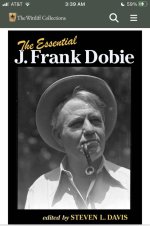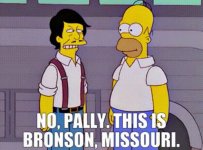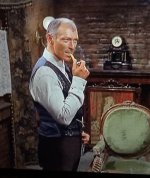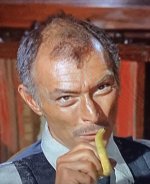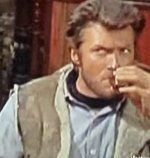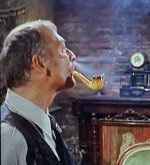Famous Historical Pipe Smokers
- Thread starter slavman68
- Start date
You are using an out of date browser. It may not display this or other websites correctly.
You should upgrade or use an alternative browser.
You should upgrade or use an alternative browser.
SmokingPipes.com Updates
Watch for Updates Twice a Week
I love Tennison's hat............Alfred Lord Ternnyson, British Poet Laureate (1809-1892), a dedicated pipe smoker and, though he was a much-photographed man for his time, I haven't been able to find a photo of him actually with one of his pipes. He is known to have had a rack of 14 pipes (including a Powhatan Native American pipe sent him from the USA, which he also smoked), using them in a fortnightly rotation. Photos of his pipes are out there on the web, but all those I've found are either copyrighted or in non-shareable .webp format - but they include a couple of clays, a straight Meerschaum egg and a bent Meer egg with an amber stem, the shank twice mended with white metal collars, clearly much smoked and loved. What he enjoyed in his pipe, who knows? Perhaps there's an archive of his personal papers somewhere, like his former home at Farringford Manor on the Isle of Wight, which includes detailed bills from his tobacconist...
View attachment 346095
Tennyson is channeling his inner Dr. Who in that picture!
There are some real stretches of both "historical" and "famous"
Early on my wife and I watched that show, "Dancing with the Stars." Then they started having unheard of folks like "Sally Q. Smackmadam" as one of the stars. It was really a stretch............There are some real stretches of both "historical" and "famous"
Jefferson Davis
I can't find a picture of him smoking, but here is one of his pipes.
View attachment 326197
View attachment 326198
Nice pipe, wow!
Ooh I just found this, that shows another pipe he owned.
That’s awesome I had no idea Bronson was a pipe guy!
Edward Thomas (1878-1917), vastly underrated English poet, personal friend and protege of the far better-known poet Robert Frost. Killed by what was probably a sniper's bullet at the Battle of Arras whilst lighting his pipe. Frost had urged Thomas not to enlist in the Army but to return with him to America instead. Thomas' refusal was, I think, a tragedy for English literature. In my humble opinion he has few poetic rivals for scene-setting and evoking a sense of place (but Frost being one of them). I don't know which of Thomas' three children is sitting with him but I imagine it's the eldest, Merfyn, and the photograph taken about 1902.
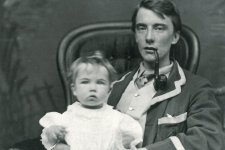

Paul Kruger (1825-1904), President of the South African (Boer) Republic, and probably the most hated man by the British at the turn of the 19th century, as he led the fight (albeit unsuccessfully) against the Boer Republic's annexation by the British Empire. Although not its inventor, the distinctive 'Oom Paul' ('Uncle Paul') pipe is named after him. British political cartoonists of the time were fond of portraying generic Boers as bearded oafs festooned with cartridge belts and perpetually sucking on Oom Paul pipes. Curiously, it was also the Second Boer War (1899-1902) which occasioned the popularity of the kalabash pipe in Britain, brought home as souvenirs from South Africa by soldiers of the British imperial expeditionary forces, but that's another story you can read about here: https://www.smokingpipes.com/smokingpipesblog/single.cfm/post/origins-the-calabash-pipe. No idea what the old boy stuffed into that pipe: Rooi Perd, perhaps 
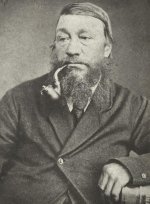

Well, infamous is a sort of famous, I guess.
And that's the first photo of that dick smoking a Hungarian shape pipe....if indeed it is he.
You might surmise I dislike the name "Oom Paul" as well as Herr Kruger.
And that's the first photo of that dick smoking a Hungarian shape pipe....if indeed it is he.
You might surmise I dislike the name "Oom Paul" as well as Herr Kruger.
@jpmcwjr - Well, since we've already had Stalin in this line-up I reckoned Mr. K. would qualify. The photograph seems to me to be the same person the older, more familiar images one sees, though I concede it might not be he, whatever Google says. It would be interesting to know how the Hungarian pipe became popular in South Africa (perhaps it was a Habsburg imperial/pan-Germanic cultural thing?)Well, infamous is a sort of famous, I guess.
And that's the first photo of that dick smoking a Hungarian shape pipe....if indeed it is he.
You might surmise I dislike the name "Oom Paul" as well as Herr Kruger.
And now another health reason to not smoke.Battle of Arras whilst lighting his pipe.

If our country had found gold under the 13 colonies anywhere near the degree that was found under the SAR and OFS, we’d either be subjects to this day, or probably a little less Anglophilic for sure…Well, infamous is a sort of famous, I guess.
And that's the first photo of that dick smoking a Hungarian shape pipe....if indeed it is he.
You might surmise I dislike the name "Oom Paul" as well as Herr Kruger.
- I can think of many worse ways to go than whilst lighting up...And now another health reason to not smoke.
Good God! Was he ugly!Paul Kruger (1825-1904), President of the South African (Boer) Republic, and probably the most hated man by the British at the turn of the 19th century, as he led the fight (albeit unsuccessfully) against the Boer Republic's annexation by the British Empire. Although not its inventor, the distinctive 'Oom Paul' ('Uncle Paul') pipe is named after him. British political cartoonists of the time were fond of portraying generic Boers as bearded oafs festooned with cartridge belts and perpetually sucking on Oom Paul pipes. Curiously, it was also the Second Boer War (1899-1902) which occasioned the popularity of the kalabash pipe in Britain, brought home as souvenirs from South Africa by soldiers of the British imperial expeditionary forces, but that's another story you can read about here: https://www.smokingpipes.com/smokingpipesblog/single.cfm/post/origins-the-calabash-pipe. No idea what the old boy stuffed into that pipe: Rooi Perd, perhaps
View attachment 347019
Robert Erskine Childers (1870-1922), a keen yachtsman shown here aboard his yacht 'Vixen' on the Solent in 1898. It looks like a military mount billiard he's clenching: I wonder what was in it? He is perhaps best known for his novel 'The Riddle Of The Sands' (1903), an espionage thriller that prophetically foretold the outbreak of the First World War, during which he served as a Lieutenant-Commander in the Royal Naval Air Service. Born into an Anglo-Irish landowning family in the county Wicklow, he became an advocate of Irish independence and used his seamanship skills in gun-running for the IRA. An active opponent of the partition of Ireland in the creation of the Irish Free State in 1921, a year later he was arrested by the Provisional Government of the Irish Free State and sentenced to death by firing squad. His final words, spoken to the firing squad, were: "Take a step or two forward, lads, it will be easier that way."
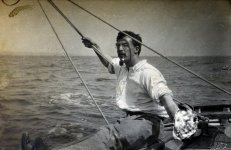

Last edited:
Tatanka Iyotake ('Sitting Bull'). Here's an apocryphal story about his pipe-smoking I gleaned off the web:
"...in 1872, the Lakota warriors attempted to block construction of the railroad near the Yellowstone River. The U.S. Army was there to provide protection for the railroad and a battle ensued. As the battle turned into a standoff, the Oglala Lakota warrior Crazy Horse displayed his bravery by riding in front of the soldiers armed only with a spear. Then Sitting Bull stepped forward. He put his rifle on the ground and walked towards the line of soldiers with his pipe.
The soldiers began firing. With bullets kicking up the dirt around him, Sitting Bull sat down and shouted back to his fellow warriors, "Whoever wishes to smoke with me, come." Only four men, including Sitting Bull's nephew White Bull, sat with him as bullets buzzed past their heads and hit the ground at their feet and legs. The four men anxiously smoked as fast as they could, but noted that Sitting Bull "just sat and looked around and smoked peacefully."
After smoking the pipe, Sitting Bull calmly picked up a stick and cleaned out the pipe bowl before standing up. He then turned, and at a leisurely pace, walked back towards home as the bullets hit the dirt behind him. The Lakota warriors were in awe that not one bullet struck him during the entire episode and he had shown no fear. As White Bull later recalled, this was the "most brave deed possible" and "counted more than counting coup."
(Source: Philbrick, Nathaniel. The Last Stand: Custer, Sitting Bull, and the Battle of the Little Big Horn. New York: Viking, 2010).
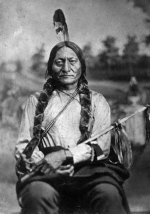
"...in 1872, the Lakota warriors attempted to block construction of the railroad near the Yellowstone River. The U.S. Army was there to provide protection for the railroad and a battle ensued. As the battle turned into a standoff, the Oglala Lakota warrior Crazy Horse displayed his bravery by riding in front of the soldiers armed only with a spear. Then Sitting Bull stepped forward. He put his rifle on the ground and walked towards the line of soldiers with his pipe.
The soldiers began firing. With bullets kicking up the dirt around him, Sitting Bull sat down and shouted back to his fellow warriors, "Whoever wishes to smoke with me, come." Only four men, including Sitting Bull's nephew White Bull, sat with him as bullets buzzed past their heads and hit the ground at their feet and legs. The four men anxiously smoked as fast as they could, but noted that Sitting Bull "just sat and looked around and smoked peacefully."
After smoking the pipe, Sitting Bull calmly picked up a stick and cleaned out the pipe bowl before standing up. He then turned, and at a leisurely pace, walked back towards home as the bullets hit the dirt behind him. The Lakota warriors were in awe that not one bullet struck him during the entire episode and he had shown no fear. As White Bull later recalled, this was the "most brave deed possible" and "counted more than counting coup."
(Source: Philbrick, Nathaniel. The Last Stand: Custer, Sitting Bull, and the Battle of the Little Big Horn. New York: Viking, 2010).

I beg your pardon, that’s Meneer Kruger. 🫡. . . I dislike the name "Oom Paul" as well as Herr Kruger.





